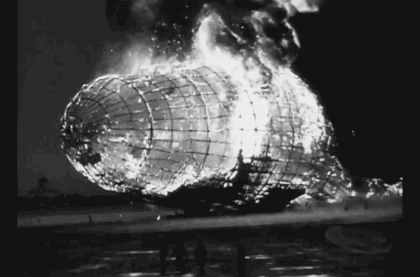
Social media mastery has proven somewhat elusive for many brands — they have to figure out how to be funny, entertaining and human, all while maintaining the brand voice and following social media guidelines. Oh, and there’s all that pressure to do that thing called real-time marketing — thanks in no small part to a certain Super Bowl tweet that shall go unnamed. Juggling all of that is no easy task, and inevitably some brands have had to learn the hard way what not to do on social.
Here are Digiday’s choices for the worst Twitter fails from 2013. From racist tweets to hijacking Twitter buzz around a tragedy, a few companies that will not remain nameless took some wee missteps on Twitter. The rest of the brands out there, take note of what these five brands did and avoid these types of mistakes in 2014.
Bank of America
This past July, activist Mark Hamilton (@darthmarkh) took to Twitter to talk about how he’d been chased away from a Bank of America by cops after drawing an anti-foreclosure message on the sidewalk. Hamiton’s tweet lead to a stream of other tweets criticizing on the bank. And unfortunately for B of America, its reaction to the tweets only made things worse by responding to activist messages with canned tweets about helping them with account issues. If that wasn’t bad enough, when Digiday reached out to Bank of America, a spokesperson explained that the tone-deaf tweets were not the work of bots but rather real people. The incident made the bank appear clueless when it comes to social media and only reinforced what its critics’ view of the bank as lacking “a heart and soul.”
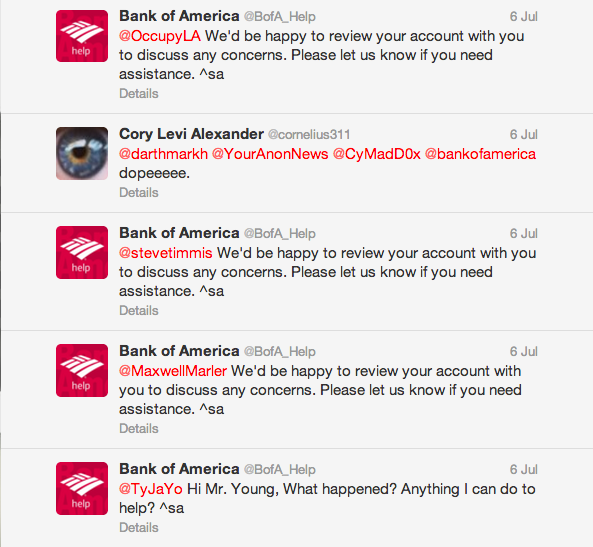 Cringe Factor: 6.5
Cringe Factor: 6.5
It’s one thing to have bots responding on social media, and it’s another to have people who sound like bots responding to people on social media. The point of social is for brands to be able to show their human sides and personality — not to reinforce the notion that brands are just faceless entities trying to make money.
Burger King
Burger King learned a valuable lesson — actually, make that lessons — about Twitter this year: Make sure you have a secure password, and for God’s sake, make sure someone is actually actively monitoring the account, and don’t wait for several hours after your account has been hacked to fix the situation. On Feb. 18, an unknown hacker hijacked the fast food brand’s Twitter account and started tweeting out some inappropriate content — even going so far as to change the burger chain’s Twitter avatar and handle name to that of competitor McDonald’s. The stream of hacked tweets included expletives, references to rappers and “IThugs” and, worst of all, tweets about employees taking drugs and an image of someone shooting up heroin. Not exactly on-brand messaging. It took the company a few hours to realize what was going on before it suspended the account.
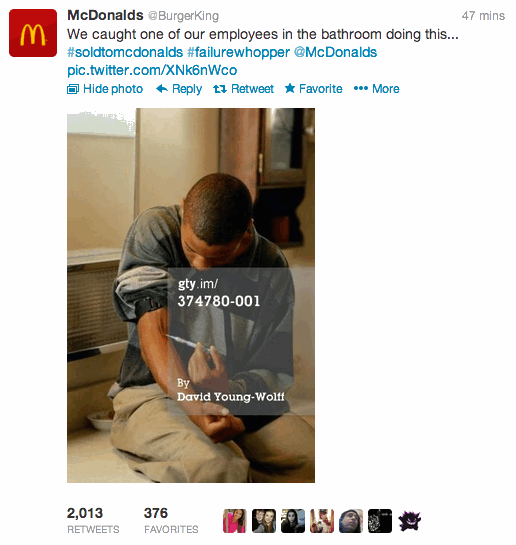
Cringe Factor: 7.5
Burger King definitely should have caught this sooner, and all of the explicit tweets are pretty much every brand’s worst nightmare. But there was a silver lining: Burger King gained thousands of followers following the hijacking.
The Onion
The Onion usually gets it right when it comes to being funny, but it totally missed the mark with its Oscar tweet about 9-year-old “Beasts of the Southern Wild” actress Quvenzhané Wallis. The humor site called the child something that rhymes with “punt.” Needless to say, The Onion faced intense backlash, and the tweet was deleted an hour later. The company’s CEO Steve Hannah issued an official apology the next morning, calling the tweet “crude and offensive,” and explained that the person responsible would be disciplined and that there would be new, “tighter Twitter procedures” to prevent something like this from happening again. A rule of thumb for media brands and brands in general: Don’t call a kid a “c u next Tuesday.” Got it? Never OK. Not even as a joke.
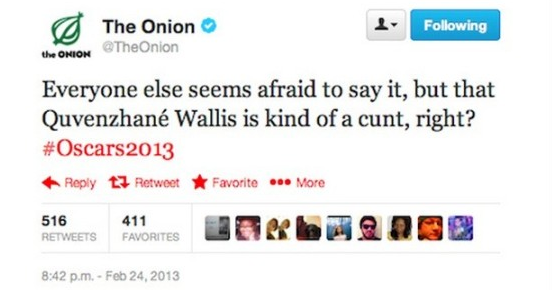
Cringe Factor: 9.5
This wasn’t funny. This was rude. The Onion should have known better.
Home Depot
In early November, Home Depot, in promoting College Gameday, posted a pretty racist tweet, which featured three young men sitting in front of a Home Depot poster and drumming on plastic buckets. “What’s so bad about that?” you may be asking yourself — well, two of the men pictured were black, and the person in the middle was wearing a gorilla costume. The tweet copy? “Which drummer is not like the others.” Yikes. Of course, it didn’t take long for the Twitterverse to take note of the objectionable tweet, and Home Depot quickly deleted it and tweeted several apologies for “the dumb tweet,” explaining that the company has no tolerance for “anything this stupid and offensive.”
Home Depot also tweeted that it was firing the agency and individual responsible, but would not confirm to Digiday which agency was behind the tweet — or whether it was even an agency’s fault in the first place. Ignorant oversight or not, brands should know by now that they should avoid ever tweeting anything that has even the slightest chance of being interpreted as racist.
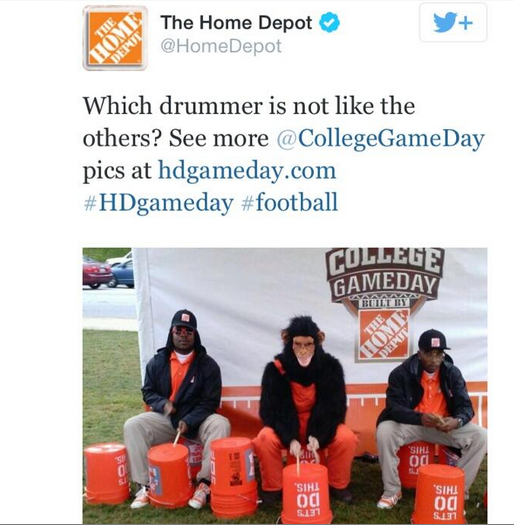
Cringe Factor: 9.8
We want to try to believe that this was the result of naivete and ignorance and not just blatant racism, but it’s unclear how and why such an inappropriate post was tweeted.
Epicurious
In the wake of April’s horrifying Boston Marathon bombing, Epicurious had the nerve to tweet out a recipe suggestions for those in Boston and New England. It’s safe to say that no one in Boston was going to Twitter for scone tips on the day of the attack — while people were still frantically trying to locate loved ones and keep track of news updates. This is one of the worst examples of a brand’s attempt at “real-time marketing” — a company using a national tragedy as an opportunity to chime in about its own content.
Adding literal insult to literal injury, Epicurious’ first response was to tweet “apologies,” saying that it was sorry if the Boston tweets “seemed” insensitive. Epicurious then deleted those tweets and finally tweeted an actual apology, admitting that the tweets were, “frankly, insensitive.”
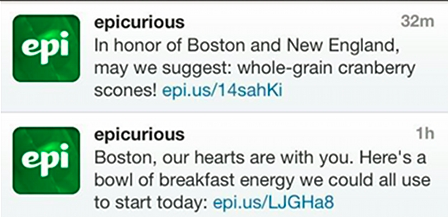
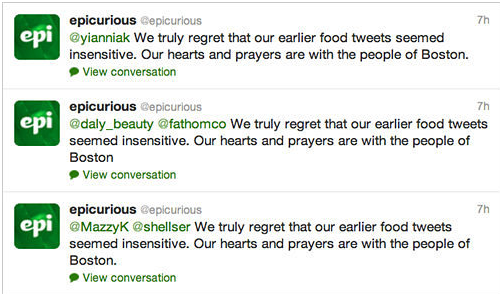
Cringe Factor: 10
This is not how you handle social media during unfolding national tragedies, and it is not how you apologize when you mess up. Double fail for tweeting so shamelessly and then failing to immediately take full responsibility with the weaselly “seemed insensitive.” Brands should know by now that the best social media policy during these kinds of tragic events is to stay respectfully quiet.
More in Marketing

YouTube’s upmarket TV push still runs on mid-funnel DNA
YouTube is balancing wanting to be premium TV, the short-form powerhouse and a creator economy engine all at once.

Digiday ranks the best and worst Super Bowl 2026 ads
Now that the dust has settled, it’s time to reflect on the best and worst commercials from Super Bowl 2026.

In the age of AI content, The Super Bowl felt old-fashioned
The Super Bowl is one of the last places where brands are reminded that cultural likeness is easy but shared experience is earned.





